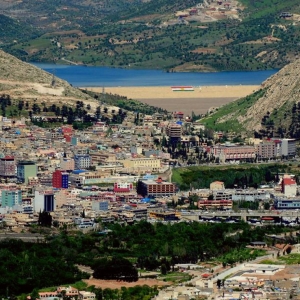Federal Water Tap, October 26: Trump Interjects in Nile Dam Dispute
The Rundown
Trump inflames a Nile basin water conflict by suggesting Egypt could bomb a contested dam in Ethiopia. Energy regulators propose a one-year time limit on state water quality reviews of gas pipelines. The EPA announces recipients of $40 million in funding to remove lead pipes. The EPA also proposes new regulations on the discharge of pollutants from commercial ships. U.S. Geological Survey researchers assess groundwater changes in Death Valley. And lastly, sea-level rise is leading to more flooding.
“At 75 percent of these East and Gulf Coast locations, [flooding is] now accelerating on an annual basis. That’s a very important notion to understand. And once infrastructure becomes compromised, once [those impacts are noticed], the change is going to be quick rather than a slow process.” — William Sweet, a NOAA oceanographer who specializes in sea-level rise and flooding, speaking with the Washington Post about king tide flooding. King tides, which are the highest of the year, are being pushed higher by rising seas.
In context: For Honolulu, Rising Seas Deliver Flood Risks Three Ways
By the Numbers
$40 million: Grant funding that was allocated to schools, day cares, and communities for removing lead pipes. Two Michigan cities — Benton Harbor and Grand Rapids — received $5 million each and Providence received $6 million. Six states and the District of Columbia received grants for removing lead pipes in schools. The money was authorized in a bill that Congress passed in 2016. (EPA)
News Briefs
Nile Basin Comments
President Donald Trump inflamed tensions over a water conflict in the Nile basin when he said that Egypt has “to do something” about a newly completed dam in Ethiopia and suggested that Egypt might bomb the structure.
The Grand Ethiopian Renaissance Dam is the largest in Africa and is located on the largest tributary of the Nile, which supplies most of Egypt’s surface water. Ethiopia began filling the dam this summer, but it has not reached agreement with Egypt and Sudan over how the dam will be operated in dry years. The U.S. had been helping broker those discussions, but the African Union is now leading the mediation.
“It’s a very dangerous situation, because Egypt is not going to be able to live that way,” Trump said. “And they’ll end up blowing up the dam. And I said it — and I say it loud and clear, ‘They’ll blow up that dam.’ And they have to do something.”
Trump made the comments during a conference call on October 23 with Abdalla Hamdok, the prime minister of Sudan, and Benjamin Netanyahu, the prime minister of Israel.
Gedu Andargachew, the foreign minister of Ethiopia, summoned the U.S. ambassador to Ethiopia to clarify the president’s remarks. Trump indicated that he had cut funds to Ethiopia.
In a statement posted by the Ethiopia Ministry of Foreign Affairs, Andargachew said that “the incitement of war between Ethiopia and Egypt from a sitting US president neither reflects the longstanding partnership and strategic alliance between Ethiopia and the United States nor is acceptable in International Law governing interstate relations.”
Several Democratic representatives and former officials — including Rep. Jason Crow and former deputy secretary of state Antony Blinken — called the statement “reckless.” Josep Borrell, the European Union foreign affairs minister, said that with discussions ongoing now is not the time for increasing tensions.
Water Quality Permits for Gas Pipelines
Federal energy regulators issued a proposed rule that defines the length of time that state authorities will have to grant water quality permits to gas pipelines.
The proposal gives states one year from receipt of an application to approve or deny a project. The strict timeline was requested in an executive order from President Trump.
Public comments are being accepted through November 18 via www.ferc.gov using docket number RM20-18-000.
Ship Discharge
The EPA proposed new regulations on the discharge of pollutants from ships and other commercial vessels into coastal and inland waters.
The rule, which aims to address invasive species, nutrient pollution, bacterial contamination, heavy metals, and oil, applies technology-based standards to about 82,000 vessels. The pollutants can be carried in ballast water, toilet water, water from sinks, and leaks from engines.
Public comments are being accepted through November and should be submitted at www.regulations.gov using docket number EPA-HQ-OW-2019-0482.
Studies and Reports
Groundwater Changes in Death Valley
U.S. Geological Survey researchers used computer models to simulate changes in groundwater levels in Death Valley’s aquifer system over the next century.
The study used four scenarios to evaluate how groundwater declines affect key indicators: the flow of several area springs and water levels in Devils Hole, which is home to federally protected fish. The study looked only at increases in pumping, not the influence of climate change.
On the Radar
Rural Advisory Committee Meeting
The committee that advises the EPA on rural and farming issues will hold a public meeting on November 12 and 13. Two main items are on the agenda: pesticides and establishing benchmarks for water quality and quantity.
Registration is free.
Federal Water Tap is a weekly digest spotting trends in U.S. government water policy. To get more water news, follow Circle of Blue on Twitter and sign up for our newsletter.
Brett writes about agriculture, energy, infrastructure, and the politics and economics of water in the United States. He also writes the Federal Water Tap, Circle of Blue’s weekly digest of U.S. government water news. He is the winner of two Society of Environmental Journalists reporting awards, one of the top honors in American environmental journalism: first place for explanatory reporting for a series on septic system pollution in the United States(2016) and third place for beat reporting in a small market (2014). He received the Sierra Club’s Distinguished Service Award in 2018. Brett lives in Seattle, where he hikes the mountains and bakes pies. Contact Brett Walton





Leave a Reply
Want to join the discussion?Feel free to contribute!